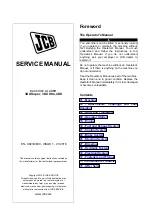
3-29
OPERATION
HANDLING IN COLD
CLIMATES
PREPARING FOR COLD CLIMATES
Starting engine in cold climates is not easy,
and it becomes more difficult if the coolant
freezes. Prepare for cold-climate problems
as follows.
Replacing the fuel and lubricant
Replace the hydraulic oil, engine oil and fuel
with those intended for cold climates.
Refer to “Fuel and lubricant table” on page
5-4.
Engine coolant
WARNING
The engine coolant is combustible. Keep
away from flame.
Use long-life coolant (antifreeze) and tap
water for the engine coolant.
Note:
New machines are delivered with JIS
Type 2 long-life coolant (antifreeze) at a
concentration of 50%.
Refer to “Lubricant table” on page 5-5.
Battery
As the temperature drops, the battery
performance decreases.
Inspect the battery. If it is discharging,
contact a Takeuchi service agent to have the
battery recharged.
Refer to “Inspecting the battery fluid level
and replenishing” on page 5-28.
HANDLING IN COLD CLIMATES
CAUTIONS AFTER OPERATIONS
Observe the following cautions to prevent
mud, water, or the undercarriage from
freezing and making it impossible for the
machine to move.
• Remove all mud and water from the
machine body. In particular, wipe the
hydraulic cylinder rod clean to prevent
damage to the seal caused by mud or dirt
on the rod surface getting inside the seal
together with drops of water.
• Park the machine on hard and dry ground.
If this is impossible, park the machine on a
wooden board placed on ground.
• Drain any water in the fuel tank to prevent it
from freezing.
Refer to “Draining the water from the fuel
tank” on page 5-27.
• As the battery capacity drops markedly in
low temperatures, cover the battery or
remove it from the machine and keep it in a
warm place.
If the electrolyte level is low, add distilled
water in the morning before beginning
work. To prevent the battery electrolyte
from freezing in the night, do not add water
after the day’s work.
AFTER THE COLD CLIMATE
When the climate becomes warmer, do as
follows:
• Replace the fuel and oil for all parts with
those specified in the “Fuel and lubricant
table”.
Refer to “Fuel and lubricant table” on page
5-4.
• If a coolant of “one season type” is used,
drain the cooling system completely, clean
out the inside of the cooling system
thoroughly, and fill with tap water.
Refer to “Cleaning the engine cooling
system” on page 5-36.
Summary of Contents for TB128FR
Page 1: ...C 1...
Page 10: ...0 8...
Page 11: ...1 1 SAFETY...
Page 44: ...1 34 SAFETY SAFETY SIGNS DECALS...
Page 45: ...1 35 SAFETY SAFETY SIGNS DECALS...
Page 46: ...1 36 SAFETY SAFETY SIGNS DECALS...
Page 47: ...2 1 CONTROLS...
Page 79: ...3 1 OPERATION...
Page 89: ...3 11 MEMO...
Page 111: ...4 1 TRANSPORT...
Page 115: ...4 5 TRANSPORT HOISTING THE MACHINE Three point suspension...
Page 117: ...5 1 MAINTENANCE...
Page 172: ...5 56...
Page 173: ...6 1 TROUBLESHOOTING...
Page 186: ...6 14...
Page 187: ...7 1 SPECIFICATIONS...
Page 189: ...7 3 MEMO...
Page 190: ...7 4 SPECIFICATIONS MACHINE DIMENSIONS Canopy MACHINE DIMENSIONS...
Page 192: ...7 6 SPECIFICATIONS Cab MACHINE DIMENSIONS...
Page 194: ...7 8 SPECIFICATIONS OPERATING RANGES OPERATING RANGES...
Page 196: ...7 10 MEMO...
Page 198: ...7 12 SPECIFICATIONS Standard arm LIFTING CAPACITIES...
Page 199: ...7 13 SPECIFICATIONS Standard arm LIFTING CAPACITIES...
Page 200: ...7 14...
Page 201: ...8 1 OPTIONS...
















































